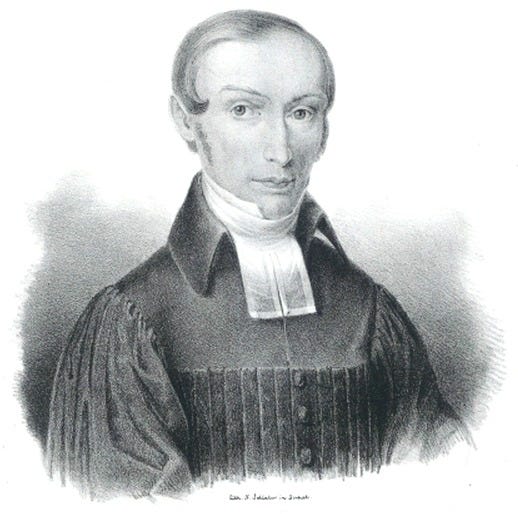Hebrew proven to be the original language of mankind; not merely of the Jews
Both Scriptural philology and the history of the nations testify to this fact.
We can prove that Hebrew was the original language of mankind, from both (1) the meaning of the names, (2) the record we have of these names being passed down to the nations.
~~~
1) The antiquity of Hebrew proved by Scriptural philology
The historian and philologist Samuel Bochart argued the antiquity of the Hebrew language from the meaning of names and places before the birth of Abraham, even. Summarizing his argument, Theophilus Gale writes concerning Bochart:
“Further, that the Hebrew tongue was of all most ancient, he proves from the etymology of the names extant in the history of Moses, from the creation of the world to the dispersion of the nations. So the Garden of Eden עדן signifies with the Hebrews a garden of pleasures or delights. The land of Nod, is called by the Hebrews נוד i.e. a land of banishment; because Cain was banished thither. So Babel בבל confusion, אדם Adam, חיה Eve, קין Cain, etc. Thus Bochart (fol. 57).”
We can build on a foundation laid for us by Bochart, to examine certain names:
Adam (אָדָ֖ם) has the meaning of man in Genesis 1:26-27, where God first says: “Let us make man (אָדָם – adam in our own image,” and multiple times in Genesis 2, before Adam is first named in verse 19. It is also related to the word for ground, which is אֲדָמָה – adamah, thus Genesis 1:25: “every thing that creepeth הָֽאֲדָמָ֖ה (upon the earth) after his kind;” Genesis 2:7: “And the Lord God formed man (אֶת-הָאָדָם – et ha’adam) of the dust of the ground (מִן-הָאֲדָמָה – min ha’adamah).” From this word, we also get the color red, which is the color of earth, such as in Genesis 25:25: “And the first came out red (אַדְמוֹנִי – admoni).
Eden (עֵדֶן) has the meaning of pleasure (עֵדֶן – eden), such as when Sarah says: “Therefore Sarah laughed within herself, saying, After I am waxed old shall I have pleasure (עֶדְנָ֔ה – ednah), my lord being old also?” (Genesis 18:12). Similarly, Psalm 36:8: “thou shalt make them drink of the river of thy pleasures (עֲדָנֶ֣יךָ – adaneikha), and 2 Samuel 1:24: “Ye daughters of Israel, weep over Saul, who clothed you in scarlet, with other delights (עֲדָנִ֔ים – adanim),” and Jeremiah 51:34: “he hath filled his belly with my delicates (מֵֽעֲדָנָ֑י – adanai).”
Eve is related to life, thus Genesis 3:20: “And Adam called his wife’s name Eve (חַוָּה – khavah); because she was the mother of all living (חָי).”
As Keil notes:
“It was through the power of divine grace that Adam believed the promise with regard to the woman's seed, and manifested his faith in the name which he gave to his wife. חוּה Eve, an old form of חיּה , signifying life ( ζωή , lxx), or life-spring, is a substantive, and not a feminine adjective meaning “the living one,” nor an abbreviated form of מחוּה , from חוּה = חיּה (Genesis 19:32, Genesis 19:34), the life-receiving one. This name was given by Adam to his wife, “ because,” as the writer explains with the historical fulfilment before his mind, “ she became the mother of all living,” i.e., because the continuance and life of his race were guaranteed to the man through the woman.”
Peter Martyr Vermigli commented:
“Adam, knowing that her seed would bruise the devil and death, justly and with propriety chose to call her by that name, by which this salutary promise of God might at all times occur to his mind. Now Adam had entertained hopes of life by Christ, and when he perceived that his wife was to be the mother of him, and of all those who were to be quickened by him, called her name Eve, because she was the mother of the living.”
We see the attachment of names to their meanings via a phonological similarity in Genesis 4:1 also: “And Adam knew Eve his wife; and she conceived, and bare Cain (קַ֔יִן – Qayin), and said, I have gotten (קָנִ֥יתִי – qaniti) a man from the Lord.” Similarly, Genesis 4:25: “25 And Adam knew his wife again; and she bare a son, and called his name Seth (שֵׁת – Set): For God, said she, hath appointed (שָׁת – sat) me another seed instead of Abel, whom Cain slew.”
We then have Enoch, whose name is connected to the sense of instruction, teaching, and catechism; Methuselah, whose name means death and sending; Noah, whose name means comfort – all names with specific meaning in Hebrew.
~~~
2) The forms of the names, not just the meanings, have been passed down the generations
William Whitaker (A Disputation on Holy Scripture) noted that:
“Whilst all other races were punished with a sudden change of dialect, Heber preserved his ancient language, and transmitted it to his posterity, not all of them indeed, but that line from which Abraham descended. And along with the language, the pure religion also was propagated in the family of Abraham. Furthermore, in that perturbation and confusion of tongues which took place at Babel, the Hebrew was the mother of the rest. For the others are generally but dialects and varieties of this, some more closely allied and bearing a greater resemblance to their parent, while others have deflected further from the primitive stock: but all the rest are derived from it. “We may perceive,” says Jerome on Zephaniah 3, “that the Hebrew language is the mother of all languages”.”
That men spoke Hebrew specifically, rather than a lost worldwide language generally, can be proven from the fact that the specific names of Japheth and Ham have echoes in antiquity. Here we see Theophilus Gale writing on Samuel Bochart in The Court of The Gentiles, Part 1 On Philology):
“So in Phaleg (3.1), Bochart proves that from Japheth, mentioned in Genesis 10:2, the Greeks refer their first plantations and genealogies to Iapetus, whom they make to be the most ancient man; so that it passed even into a proverb: “older than Iapetus,” or Iaphetus. Thus from Javan, Japheth’s son (Genesis 10:2), the Greeks derived their Ionians. Also from אֱלִישָׁה Elishah, Javan’s son, Genesis 10.4 the Greeks derived their Elis, Elysian fields, Hellas, and Eolus; as in Phaleg (3.4). So from Kittim in Genesis 10:4, כִּתִּים the Greeks named Citium, a city in Cyprus; as in Phaleg (3.4).Thus from תַרְשִׁישׁ Tarshish (Genesis 10:4) came Iberis, or Spain; as Phaleg 3.7. The like origins of regions or cities, Bochart collects from the other sons of Japheth. He also demonstrates the same in Ham and his posterity, who peopled Canaan, Egypt, and Africa. Thus from Cham, Egypt is styled, in Plutarch, Chemia, for Chamia, i.e. the land of Cham, as it is styled in the Psalms. And from Canaan, the son of Ham (Genesis 10:6), Phoenicia was called by the Greeks Χνα, which is the contraction of Canaan; thence in Stephanus the inhabitants of Phoenicia, or Canaan, are called Χνάοι, from כְנָעַן Canaan; as Bochart (Phaleg 4.34). Whence Herodotus tells us that: “The Egyptians called Jupiter Ammun: Αμμον γαρ Αιγυπτιοι καλεουσι τον Δια, for the Egyptians call Jupiter Ammun.” So Raleigh (History of the World 1.1 §6) tells us that “The Egyptians, even after the flood, began to entitle Ham, the parent of their own Mizraim, Chammon, or Hammon.”
And further, on the supreme god of the Greeks:
“Others styled him Ζεύς from ζέσιν: heat, because the sun was thought to be fire. Whence he was also styled Jupiter Hammon, from חם Ham, or חמה Hamma, which signifies the sun; thence חמן Amman, the temple of the sun. He was called also Ηλιοπολίτης Jupiter of Heliopolis, who was no other than the sun, as Vossius (De Idololatria 2.13).”
~~~
3) Conclusion
Hebrew is thus the shared language of humanity, and it is wrong to frame it either as a language exclusively for Jews, or one that has been wholly corrupted to the point of being useless.
For those interested in their national and racial heritage, it would be most tragic and ironic to reject the foundational language of all races, which God has preserved forever in the Masoretic Text:
The words of the Lord are pure words: as silver tried in a furnace of earth, purified seven times. Thou shalt keep them, O Lord, thou shalt preserve them from this generation for ever. (Psalm 12:6-7)








